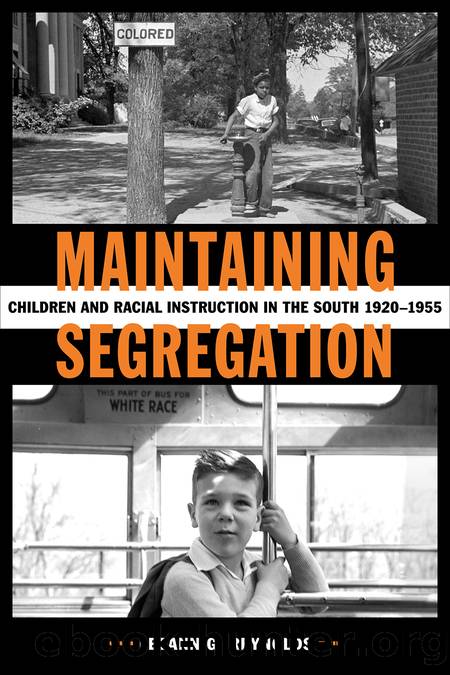Maintaining Segregation: Children and Racial Instruction in the South, 1920-1955 by LeeAnn G. Reynolds

Author:LeeAnn G. Reynolds [Reynolds, LeeAnn G.]
Language: eng
Format: epub
Tags: Civil Rights, Political Science
ISBN: 9780807165669
Google: 9YMjDQAAQBAJ
Publisher: LSU Press
Published: 2017-05-08T10:57:48+00:00
CHAPTER 5
TO MAKE THE TOLERABLE INTOLERABLE
Black and White Racial Awakenings
Writing in response to Richard Wrightâs 1940 novel, Native Son, Mississippi author David L. Cohn concluded, âMr. Wright obviously does not have the long view of historyâ because he demanded both political rights and social equality for African Americans and was not willing to wait for them, as Cohn and other like-minded racial moderates had been advising black southerners to do for some time. Cohn stressed, âJustice or no justice, the whites of America simply will not grant to Negroes at this time those things that Mr. Wright demands.â1 The proponent of an elite-led gradualism that he believed would result in the eventual amelioration of race relations within the segregated system, Cohn thought an untimely appeal for immediate change in the social and political status of African Americans in the South would have dire consequences. Thus, he warned Wright and those who might be influenced by his work, âhatred and the preaching of hatred, and incitement to violence can only make a tolerable relationship intolerable.â2
Cohnâs reaction to Wright is revealing in that the act of making the tolerable intolerable is precisely the task that civil rights leaders faced in subsequent decades. Their goal was to convince black and white southerners that the segregated conditions they had lived with for more than a half-century were so unbearable that they must come to an immediate end. White moderates such as Cohn failed to recognize that tensions, like those subsequently created through nonviolent direct action, were necessary to effect meaningful social change through the creation of either disorder for the community or internal conflict for the individual. A number of black and white southerners remembered encounters in the decades before the civil rights movement through which they, as their successors would during the 1950s and 1960s, came to view life in the segregated South as intolerable. These realizations, or awakenings, resulted from a variety of experiences, such as travel outside the region, military service, college education, exposure to social or literary criticism, and personal encounters within the rituals of segregation. Through these experiences black and white southerners began to engage in a critique of the system they had learned to accept as a fact of southern life.
Historians have often identified such awakenings in the work of either black or white southerners. Leon Litwack deemed the moments when black children first realized life would be different for them âracial baptisms.â3 John Cell noted, âThe moment of discovery, when the black personality first comes to full recognition of the realities of life under white supremacy, is a constant topic of Afro-American autobiography.â4 Fred Hobson drew on the autobiographies of elite white southerners to inform his analysis of âthe white southern racial conversion narrative.â5 Recognition of the importance of such moments, whether one calls them awakenings, baptisms, or conversions, is central to the study of southern autobiography from this period; one must also recognize, however, that both black and white southerners remember experiencing such moments. While the
Download
This site does not store any files on its server. We only index and link to content provided by other sites. Please contact the content providers to delete copyright contents if any and email us, we'll remove relevant links or contents immediately.
What's Done in Darkness by Kayla Perrin(25500)
Shot Through the Heart: DI Grace Fisher 2 by Isabelle Grey(18219)
Shot Through the Heart by Mercy Celeste(18160)
The Fifty Shades Trilogy & Grey by E L James(17774)
The 3rd Cycle of the Betrayed Series Collection: Extremely Controversial Historical Thrillers (Betrayed Series Boxed set) by McCray Carolyn(13189)
The Subtle Art of Not Giving a F*ck by Mark Manson(12912)
Scorched Earth by Nick Kyme(11832)
Stepbrother Stories 2 - 21 Taboo Story Collection (Brother Sister Stepbrother Stepsister Taboo Pseudo Incest Family Virgin Creampie Pregnant Forced Pregnancy Breeding) by Roxi Harding(11040)
Drei Generationen auf dem Jakobsweg by Stein Pia(10217)
Suna by Ziefle Pia(10186)
Scythe by Neal Shusterman(9262)
International Relations from the Global South; Worlds of Difference; First Edition by Arlene B. Tickner & Karen Smith(8608)
Successful Proposal Strategies for Small Businesses: Using Knowledge Management ot Win Govenment, Private Sector, and International Contracts 3rd Edition by Robert Frey(8419)
This is Going to Hurt by Adam Kay(7695)
Dirty Filthy Fix: A Fixed Trilogy Novella by Laurelin Paige(6453)
He Loves Me...KNOT by RC Boldt(5804)
How to Make Love to a Negro Without Getting Tired by Dany LaFerrière(5378)
Interdimensional Brothel by F4U(5304)
Thankful For Her by Alexa Riley(5161)
